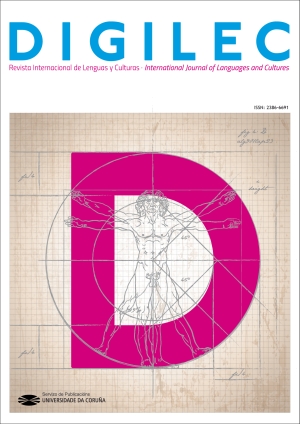Análisis de las estrategias para la enseñanza de la comprensión lectora: estudio de educación básica
Contenido principal del artículo
DOI:
https://doi.org/10.17979/digilec.2020.7.0.7166Resumen
El objetivo de este estudio es analizar las estrategias para la enseñanza de la comprensión lectora que utilizan los docentes de cuarto grado de Educación General Básica de los distritos de El Carmen y Jipijapa – Puerto López de la provincia de Manabí. Para este fin, se aplicó un cuestionario a 31 profesores de cuarto grado y a 818 estudiantes. El instrumento de evaluación utilizado consta de dos partes, (i) datos sobre la percepción de la importancia atribuida a la enseñanza de la comprensión lectora del español como primera lengua, y (ii) datos sobre el empleo de la metodología de enseñanza de la comprensión lectora del español como primera lengua. Los resultados indican que existen diferencias estadísticamente significativas entre los datos del empleo de las fases prelectura, lectura y poslectura de ambos distritos. El alumnado necesita manejar estrategias que conduzcan a una mejor compresión del texto. Las conclusiones apuntan a que la lectura requiere más atención por parte del profesorado y que la aplicación de estrategias que ayuden al alumnado en la comprensión del texto es necesaria. Por tanto, se recomienda la implementación de estrategias metodológicas pertinentes en la enseñanza de la lectura comprensiva, ya que estas proporcionan al estudiantado ventajas de índole académica y una notable mejora en su rendimiento.
Palabras clave:
Detalles del artículo
Referencias
Brown, H. y Lee, H. (2005). Teaching by principles: An interactive approach to language pedagogy. Longman: Pearson.
Cassany, D. (2006). Tras las líneas: sobre la lectura contemporánea. Barcelona: Anagrama.
Cooper, D. (1998). Cómo mejorar la Comprensión Lectora. Madrid: Visor.
Correa, R. (2011). Ley Orgánica de Educación Intercultural. Capítulo III de los Niveles y Subniveles Educativos, Art. 27.- Denominación de los niveles educativos. [Ministerio de Educación. Reglamento general a la LOEI] http://www.evaluacion.gob.ec/wp-content/uploads/downloads/2015/06/Anexob.-LOEI.pdf
Ferreiro, E. (2002). Pasado y presente de los verbos leer y escribir. México: Fondo de Cultura Económica.
Flotts, M., Manzi, J., Polloni, M., Carrasco, M., Zambra, C., y Abarzúa, A. (2016). Aportes para la enseñanza de la Lectura. [Informe UNESCO Organización de las Naciones Unidas para la Educación, la Ciencia y la Cultura, TERCE Tercer Estudio Regional, Comparativo y Explicativo, Chile]. https://www.anep.edu.uy/sites/default/files/images/Archivos/publicaciones-direcciones/DSPE/llece/terce/244874spa.pdf
Guillén, L., Frías, A., y Fernández, V. (2019). Reflexiones en torno a la evaluación de la comprensión lectora en la formación del profesional pedagógico. Mikarimin. Revista Científica Multidisciplinaria, 5(3), 2-10.
Goya, G. y Sánchez, G. (2019). Técnicas lingüísticas en la lectoescritura del subnivel medio. [Título de Pregrado, Universidad de Guayaquil]. http://repositorio.ug.edu.ec/handle/redug/47082
Hout, B. V., Simons, R. J., y Volet, S. (2000). Active learning: Self-directed learning and independent work. New learning. Springer Netherlands, 21-36. DOI: https://dx.doi.org/10.1007/0-306-47614-2_2.
López, A. (2016). El lector como usuario: implicaciones didácticas. Investigaciones sobre Lectura, 6, 36-50.
Llorens, R. (2015). La comprensión lectora en Educación Primaria: importancia e influencia en los resultados académicos. [Título de Pregrado, UNIO Universidad Internacional de la Rioja]. https://reunir.unir.net/handle/123456789/3411
Neira, M. A., Reyes, R. F., y Riffo, O. B. (2015). Experiencia académica y estrategias de comprensión lectora en estudiantes universitarios de primer año. Revista Literatura y Lingüística, 31, 221-244.
Niño Rojas, V. M. (2014). Competencias en la comunicación. Hacia las prácticas del discurso. ECOE.
Orejudo, J. (2019). Gamificar tareas de lectura en una Segunda Lengua: un Estudio Preliminar. Revista de estudios y experiencias en educación, 18(36), 95-103. https://dx.doi.org/10.21703/rexe.20191836orejudo13
Pin, N. y Arias G. (2018). Incidencia de la comprensión lectora en el desarrollo del pensamiento crítico en los estudiantes de básica media de la unidad educativa “los vergeles” del cantón Guayaquil, parroquias pascuales del año 2017. [Título de Pregrado, Universidad de Guayaquil]. http://repositorio.ug.edu.ec/handle/redug/28142
Prensky, M. (2011). Enseñar a nativos digitales. Madrid: SM.
Quintanal, J. y García, L. (2014). El desarrollo lector y su relación con la mejora de las competencias básicas. Ocnos: Revista de Estudios Sobre Lectura, 11, 71-91. https://doi.org/10.18239/ocnos_2014.11.04
Ramírez, L. (2009). ¿Qué es leer? ¿Qué es la lectura? Investigación Bibliotecológica. Sistema de Información Científica. Red de Revistas Científicas de América Latina, el Caribe, España y Portugal, 23(47), 161-188.
Rosenblatt, L. (1978). The reader, the text, the poem: The transactional theory of the literary work. Carbondale, IL: Southern Illinois University Press.
Rivas, L. (2015). Methodology for the Development of Reading Comprehension in the Teaching-Learning Process. Revisita Ciencias de la educación, 1(1), 47-61.
Santiago, G., Castillo, P., y Morales, D. (2007). Strategies and teaching/learning to read. Grupo de Investigación en Pedagogía, Lenguaje y Comunicación, GIPELEC. Folios, 26, 27-38.
Selfa, M. (2016). La lectura y la competencia lectora en el siglo XXI. Entrevista a Ascen Díez de Ulzurrium Pausas. Asociación Española de Comprensión Lectora. Málaga, España. Investigaciones sobre Lectura, 5, 81- 83.
Solé, I. (2012). Competencia lectora y aprendizaje. Revista Iberoamericana de Educación, 52, 43-61.
Soler, A. (2016). Análisis de la enseñanza en comprensión lectora en el segundo curso del primer ciclo de Educación Primaria. Educación y Futuro Digital, 12, 53-69.
Sweet, A. P. y Snow, C. E. (Eds.) (2003). Rethinking Reading Comprehension. Solving Problems in the Teaching of Literacy. New York: Guilford Publications.
Valladares, O. (2007) ¿Cómo formar niños lectores? Lima, Perú: Editorial Mantaro.
Vega, L., Bañales, F., Reyna, V., y Pérez, A. (2014). Enseñanza de estrategias para la comprensión de textos expositivos con alumnos de sexto grado de primaria. Revista Mexicana de Investigación Educativa, 19(63), 1047-1068.
Viñals, A. y Cuenca, J. (2016). El rol del docente en la era digital. Revista Interuniversitaria de Formación del Profesorado, 30(2), 103-114.


